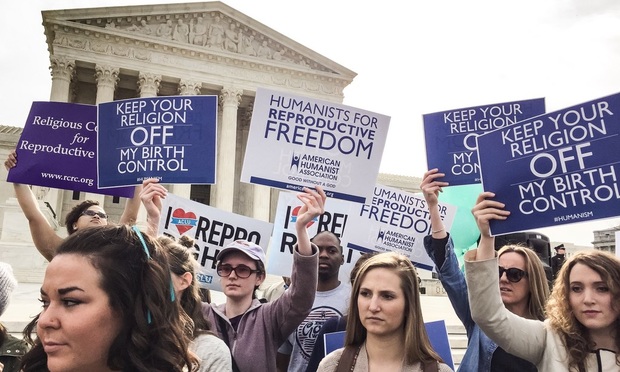5th Circuit Strikes Gibson Dunn's Pro-Obamacare Brief for Recusal Issue
The Fifth Circuit didn't give a reason, and the court clerk declined to comment. But one new member of the court hails from Gibson Dunn: James Ho.
April 08, 2019 at 02:56 PM
5 minute read
The original version of this story was published on National Law Journal
 Protesters rally on March 23, 2016, in support of the Affordable Care Act's contraceptive mandate. Credit: Diego M. Radzinschi / NLJ
Protesters rally on March 23, 2016, in support of the Affordable Care Act's contraceptive mandate. Credit: Diego M. Radzinschi / NLJ
A federal appeals court on Monday blocked the law firm Gibson, Dunn & Crutcher from filing a pro-Obamacare amicus brief because the submission would have caused the disqualification of an unidentified judge.
The U.S. Court of Appeals for the Fifth Circuit's order pointed to a newly amended federal rule for appellate litigation and to a local court rule, both of which address circumstances where a court can reject an amicus brief if allowing it would force a judge to recuse.
The appeals court did not identify the judge, and the Fifth Circuit's clerk, Lyle Cayce, declined to comment on Monday's order. Former Gibson Dunn partner James Ho was confirmed in 2017 to a seat on the Fifth Circuit. It's not uncommon for judges to weigh potential conflicts of interest arising from the appearance in court of his or her previous law firm. Ho's wife, Allyson Ho, is a Gibson Dunn partner in Dallas. She joined the firm last year from Morgan, Lewis & Bockius.
James Ho, who'd been a Gibson Dunn appellate partner continually since 2010, said in a U.S. Senate questionnaire at the time of his confirmation: “For a period of time, I anticipate recusing in all cases where my current firm, Gibson, Dunn & Crutcher, represents a party.” He also said he would recuse in any case where his wife represents a side and that he would “evaluate any other real or potential conflict, or relationship, that could give rise to appearance of conflict.”
The Gibson Dunn team—litigation partner Stuart Delery and Washington associates Andrew Wilhelm and D. William Lawrence—represented two parties: First Focus and The Children's Partnership. Both groups are backing California and other states that are defending the Affordable Care Act.
Delery, formerly an Obama-era acting associate attorney general at Main Justice in Washington, was not immediately reached for comment Monday.
An amendment to the federal rules of appellate procedure that took effect in December 2018 said “a court of appeals may prohibit the filing of or may strike an amicus brief that would result in a judge's disqualification.”
Several appellate courts had adopted local rules forbidding the filing of an amicus brief that could cause the recusal of one or more judge, and the new federal rule harmonized how courts were handling amicus briefs and recusals. There was some opposition to the proposed rule, including the argument that amicus-based recusals are rare and the fact that the rule could “prove wasteful if an amicus curiae pays an attorney to write a brief which the court then strikes.”
Gibson Dunn's brief said the various parties in the case had consented to its filing. “No party, counsel for a party, or any person other than amici curiae and their counsel made a monetary contribution to the preparation or submission of this brief,” the Gibson Dunn lawyers wrote in a footnote.
The Fifth Circuit's order did not scrub Gibson Dunn's court filing entirely from the court's website, but it did lock the file and prevent anyone from opening it. The filing was, until now, publicly available on the Fifth Circuit's website.
“The ACA indisputably benefits millions of children, young adults, and their families,” the Gibson Dunn lawyers wrote in the amicus brief. “Infants born with complex medical issues can receive care without fear of annual or lifetime limits; young adults navigating their first jobs or higher education have the protection of their parents' insurance; other children receive care through Community Health Centers and home visits.”
The Gibson Dunn lawyers added: “Given that Congress did not repeal these provisions or countless others, there is no basis to conclude that it would want the courts to strike them down—particularly given the millions of American children whose lives have been changed (and saved) because of the ACA, and given how deeply the ACA is now woven into the fabric of the nation's healthcare system and economy.”
The Fifth Circuit hasn't yet set the argument date in case. The court also has not announced the names of the three-judge panel that will hear the case.
The Justice Department, which recently dropped its defense of Obamacare and is now backing Republican state challengers to the law, on Monday asked the appeals court to hear the case in July. “Prompt resolution of this case will help reduce uncertainty in the healthcare sector, and other areas affected by the Affordable Care Act,” Martin Totaro wrote in Monday's filing.
Here's the proposed Gibson Dunn amicus brief that the court struck:
Read more:
In Reversal, DOJ Now Says Whole ACA Unconstitutional
Here's What Big Law Clients Are Saying About 'Backward' Obamacare Ruling
'Embarrassingly Bad,' 'Unmoored': Legal Scholars Bash Texas Judge's ACA Takedown
Meet the Justice Department Team That Won't Defend the Affordable Care Act
President Trump Is Packing the Courts With Law Firm Partners
This content has been archived. It is available through our partners, LexisNexis® and Bloomberg Law.
To view this content, please continue to their sites.
Not a Lexis Subscriber?
Subscribe Now
Not a Bloomberg Law Subscriber?
Subscribe Now
NOT FOR REPRINT
© 2025 ALM Global, LLC, All Rights Reserved. Request academic re-use from www.copyright.com. All other uses, submit a request to [email protected]. For more information visit Asset & Logo Licensing.
You Might Like
View All
Standing Spat: Split 2nd Circuit Lets Challenge to Pfizer Diversity Program Proceed

Fight Over Amicus-Funding Disclosure Surfaces in Google Play Appeal

'Self-Diagnosed Nickel Allergy' Fails to Find Success in Med-Mal Suit, 8th Circuit Rules
5 minute read
How We Won: BraunHagey’s $56M Trademark Win Over Molson Coors Upheld by 9th Circuit
8 minute readTrending Stories
- 1'It's Not Going to Be Pretty': PayPal, Capital One Face Novel Class Actions Over 'Poaching' Commissions Owed Influencers
- 211th Circuit Rejects Trump's Emergency Request as DOJ Prepares to Release Special Counsel's Final Report
- 3Supreme Court Takes Up Challenge to ACA Task Force
- 4'Tragedy of Unspeakable Proportions:' Could Edison, DWP, Face Lawsuits Over LA Wildfires?
- 5Meta Pulls Plug on DEI Programs
Who Got The Work
Michael G. Bongiorno, Andrew Scott Dulberg and Elizabeth E. Driscoll from Wilmer Cutler Pickering Hale and Dorr have stepped in to represent Symbotic Inc., an A.I.-enabled technology platform that focuses on increasing supply chain efficiency, and other defendants in a pending shareholder derivative lawsuit. The case, filed Oct. 2 in Massachusetts District Court by the Brown Law Firm on behalf of Stephen Austen, accuses certain officers and directors of misleading investors in regard to Symbotic's potential for margin growth by failing to disclose that the company was not equipped to timely deploy its systems or manage expenses through project delays. The case, assigned to U.S. District Judge Nathaniel M. Gorton, is 1:24-cv-12522, Austen v. Cohen et al.
Who Got The Work
Edmund Polubinski and Marie Killmond of Davis Polk & Wardwell have entered appearances for data platform software development company MongoDB and other defendants in a pending shareholder derivative lawsuit. The action, filed Oct. 7 in New York Southern District Court by the Brown Law Firm, accuses the company's directors and/or officers of falsely expressing confidence in the company’s restructuring of its sales incentive plan and downplaying the severity of decreases in its upfront commitments. The case is 1:24-cv-07594, Roy v. Ittycheria et al.
Who Got The Work
Amy O. Bruchs and Kurt F. Ellison of Michael Best & Friedrich have entered appearances for Epic Systems Corp. in a pending employment discrimination lawsuit. The suit was filed Sept. 7 in Wisconsin Western District Court by Levine Eisberner LLC and Siri & Glimstad on behalf of a project manager who claims that he was wrongfully terminated after applying for a religious exemption to the defendant's COVID-19 vaccine mandate. The case, assigned to U.S. Magistrate Judge Anita Marie Boor, is 3:24-cv-00630, Secker, Nathan v. Epic Systems Corporation.
Who Got The Work
David X. Sullivan, Thomas J. Finn and Gregory A. Hall from McCarter & English have entered appearances for Sunrun Installation Services in a pending civil rights lawsuit. The complaint was filed Sept. 4 in Connecticut District Court by attorney Robert M. Berke on behalf of former employee George Edward Steins, who was arrested and charged with employing an unregistered home improvement salesperson. The complaint alleges that had Sunrun informed the Connecticut Department of Consumer Protection that the plaintiff's employment had ended in 2017 and that he no longer held Sunrun's home improvement contractor license, he would not have been hit with charges, which were dismissed in May 2024. The case, assigned to U.S. District Judge Jeffrey A. Meyer, is 3:24-cv-01423, Steins v. Sunrun, Inc. et al.
Who Got The Work
Greenberg Traurig shareholder Joshua L. Raskin has entered an appearance for boohoo.com UK Ltd. in a pending patent infringement lawsuit. The suit, filed Sept. 3 in Texas Eastern District Court by Rozier Hardt McDonough on behalf of Alto Dynamics, asserts five patents related to an online shopping platform. The case, assigned to U.S. District Judge Rodney Gilstrap, is 2:24-cv-00719, Alto Dynamics, LLC v. boohoo.com UK Limited.
Featured Firms
Law Offices of Gary Martin Hays & Associates, P.C.
(470) 294-1674
Law Offices of Mark E. Salomone
(857) 444-6468
Smith & Hassler
(713) 739-1250








